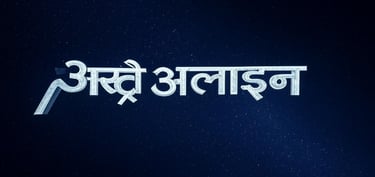"astrology for marriage"
Discover the power of horoscope matching through Vedic astrology. Explore how astrology for marriage can ensure a harmonious and blissful relationship, backed by ancient wisdom and insights.
7/24/20258 min read


Introduction to Horoscope Matching
Horoscope matching, a practice rooted in Vedic astrology, is an essential step taken by many individuals and families when seeking marital compatibility. This ancient tradition involves a detailed comparison of the astrological charts of two prospective partners to assess their alignment and determine their overall compatibility. This analysis is often referred to as 'kundali matching' or 'janam patri milan' in India, where it holds significant cultural importance.
The process of horoscope matching focuses on various astrological factors, including the positions of planets, lunar signs, and various other attributes that influence a person's character, behavior, and relationship dynamics. Many believe that a successful marriage is not merely a product of love and mutual respect but also a combination of favorable planetary positions. Vedic wisdom asserts that each individual's horoscope contains insights into their life journey, making compatibility assessment a crucial step in the marriage process.
In Indian society, the significance of horoscope matching is profound. Families often prioritize this practice to ensure not only their children's happiness but also to maintain harmony and balance in family life. The alignment of stars and planets may be thought to influence the future of the couple, including their reproductive health, financial stability, and overall marital satisfaction. This deep-rooted belief leads many to view horoscope matching as a protective measure against potential conflicts that may arise in a marriage.
As we delve deeper into this topic, it is vital to recognize that every culture has its practices regarding relationship compatibility. However, the Vedic astrology system offers a unique perspective on how celestial influences can impact personal relationships. The insights gained from horoscope matching continue to guide individuals and families, reinforcing the belief that aligning astrological energies can pave the way for a fulfilling and successful marital life.
Understanding Vedic Astrology
Vedic astrology, also known as Jyotish, is an ancient system of astrology that originated in India over 5,000 years ago. Rooted in the sacred texts known as the Vedas, this astrological discipline is grounded in the belief that celestial bodies—the sun, moon, planets, and stars—significantly influence human life. According to Vedic principles, each of these celestial entities plays a crucial role in shaping an individual's personality, habits, and overall destiny. The intricate interplay of planetary positions at the time of one's birth forms the basis for personalized astrological readings, which can be invaluable for understanding one's life path.
In Vedic astrology, the cosmos is divided into 12 houses, each associated with specific traits and aspects of life such as relationships, career, health, and spirituality. These houses serve as a framework through which the positioning of planets can be interpreted, leading to insights about an individual's past, present, and future. The placement of planets in different houses and their interactions, known as aspects, can reveal potential strengths and challenges that a person may encounter throughout their life.
The principles of Vedic astrology extend to the process of horoscope matching, which is particularly significant in the context of marital unions. By comparing the horoscopes of two individuals, astrologers assess the compatibility of their planetary placements. This analysis reveals insights into how their celestial influences might interact, providing foresight into the marital dynamics. Such assessments often highlight potential areas of harmony or discord, thus guiding individuals and families in making informed decisions regarding marriage. Emphasizing the importance of astrological influences helps individuals appreciate how Vedic astrology can contribute to a deeper understanding of compatibility and marital bliss.
The Process of Horoscope Matching
Horoscope matching, a vital aspect of Vedic astrology, serves as a foundational step to determine the compatibility of prospective partners. The process primarily involves several detailed steps, each critical in ensuring a harmonious union. The first step entails gathering birth details, which include the exact date, time, and place of birth of both individuals. This information is crucial, as the planetary positions at the moment of birth greatly influence individual characteristics and compatibility.
Once the birth details are collected, the next step is the analysis of planetary positions. Astrologers create a natal chart or horoscope for each partner, depicting the positions of the planets during their respective births. This analysis sheds light on personal traits, strengths, weaknesses, and potential challenges each partner may face. It is essential to understand how these positions impact their relationship dynamics. A thorough understanding of these planetary alignments enables astrologers to pinpoint areas of compatibility and concern.
Subsequently, the Ashtakoota score is calculated, a systematic process that evaluates compatibility on eight different parameters. These parameters include Varna (caste), Vashya (authority), Tara (birth star), Yoni (animal signs), Graha Maitri (planetary friendship), Gana (temperament), Bhakoota (psychological compatibility), and Nadi (health considerations). Each of these components contributes to an overall compatibility score, which helps in assessing the couple's potential for marital bliss. A higher Ashtakoota score indicates stronger compatibility and aligns with the understanding that marriage should be a harmonious partnership.
Overall, the detailed steps involved in horoscope matching, from collecting birth details to calculating the Ashtakoota score, combine to create a comprehensive understanding of compatibility. This procedure, rooted in Vedic wisdom, aims to promote lasting happiness in marital relationships.
Key Factors in Compatibility Assessment
Horoscope matching is an essential element in Vedic astrology, particularly when assessing compatibility for marriage. This process involves evaluating a range of factors, each contributing to the overall understanding of how well two individuals may bond in a marital relationship. Among the most significant aspects are Guna Milan, Dosha analysis, and other astrological indicators that provide insight into the couple's prospective harmony.
Guna Milan, also known as the Koota system, is a method employed to examine the compatibility of partners based on their individual natal charts. It assesses eight different qualities, or "gunas," and assigns points accordingly. A higher score in Guna Milan suggests a stronger compatibility, which could translate to greater marital bliss. This system emphasizes aspects such as emotional stability, communication styles, and personal values, ensuring that not only are zodiac signs aligned, but also that the individuals share similar life outlooks.
Another critical factor in horoscope matching is the analysis of Doshas, specifically Mangal Dosha, which arises from the positioning of Mars in a person's chart. Mangal Dosha can potentially lead to conflicts if one partner possesses it while the other does not. Therefore, assessing this aspect helps determine any inherent challenges that may need addressing, fostering an understanding of how to navigate them effectively, should the need arise.
Additionally, practitioners may consider other astrological indicators such as planetary positions, relationship dynamics, and specific combinations that both partners exhibit in their charts. These factors work collectively to provide a holistic view of compatibility, guiding individuals through the spectrum of marital harmony. By understanding these components, couples can make informed decisions that significantly impact their long-term relationship success.
Benefits of Horoscope Matching in Marriages
Horoscope matching, a practice grounded in Vedic astrology, is often sought before marriage to enhance compatibility between partners. One of the primary advantages of conducting horoscope matching is the potential to foster peace and happiness within the relationship. This ancient practice emphasizes the alignment of zodiac signs and planetary positions, which are believed to influence the personal traits and emotional needs of individuals. When partners find that their horoscopes complement each other, it sets a supportive framework for a harmonious marital relationship.
Another significant benefit is the reduction of conflicts that may arise from personality differences or life aspirations. By analyzing the horoscopes, couples can gain insights into each other's strengths and weaknesses, paving the way for a deeper understanding. For instance, if one partner has a tendency to be impulsive while the other is more meticulous, this knowledge can encourage them to approach situations with patience and compromise rather than conflict. Such awareness promotes a collaborative spirit, leading to more constructive resolutions during disagreements.
Furthermore, horoscope matching can enhance mutual understanding between partners, enriching their emotional connection. It facilitates discussions around shared values, goals, and aspirations, which are critical for long-term relationship success. Real-life examples abound; couples who have engaged in horoscope matching often report feeling more aligned in their approach to life's challenges. Testimonials from individuals who attribute their marital bliss to horoscope matching reflect a common sentiment: that understanding astrological compatibility has helped them appreciate differences and work together as a team.
In conclusion, the benefits of horoscope matching in marriages are manifold. From reducing conflicts to promoting peace and mutual understanding, this ancient practice offers valuable insights that can profoundly impact relationships. Couples who utilize horoscope matching often find themselves better prepared to navigate the complexities of married life, leading to greater satisfaction and harmony in their union.
Common Myths and Misconceptions
Horoscope matching, rooted in Vedic astrology, often finds itself surrounded by various myths and misconceptions that can distort the understanding of its significance in marital harmony. One common myth is the belief that horoscope matching is merely an outdated practice with no grounding in reality. Critics often dismiss Vedic astrology as superstition, neglecting the centuries of wisdom it has provided in navigating personal relationships. In truth, horoscope matching is a comprehensive analysis that extends beyond simple sun sign compatibility; it considers planetary positions, aspects, and individual birth charts.
Another prevalent misconception revolves around the notion that horoscope matching is a deterministic tool. Many fear that if the compatibility scores are low, it automatically signifies an impending failure of the marriage. However, experienced astrologers emphasize that matching horoscopes serves as a guideline rather than an absolute judgment on a relationship’s potential. It provides insights into strengths and challenges that may arise, thus equipping couples with the awareness needed to foster a harmonious partnership.
Additionally, some individuals believe that Vedic astrology disregards free will, suggesting that it prescribes a set course for one’s life. In reality, horoscope matching, when understood in its true essence, recognizes the role of personal choice and mutual effort. While astronomical placements can indicate tendencies and propensities, they do not eliminate the capacity for individuals to grow, adapt, and influence their circumstances.
By addressing these myths, it becomes evident that a more nuanced perspective on horoscope matching can enhance its appreciation. Vedic astrology, when approached with an open mind, offers valuable insights that can profoundly contribute to the understanding of marital dynamics. Encouraging individuals to view these astrological practices through a balanced lens can foster an enriching dialogue regarding the application of Vedic wisdom in contemporary relationships.
Conclusion: Embracing Tradition in Modern Relationships
In the contemporary world, where relationships often encounter various challenges, incorporating traditional practices such as horoscope matching can serve as a beneficial tool for ensuring marital harmony. The ancient science of astrology, particularly within Vedic traditions, provides insights that go beyond mere compatibility indicators. It dives deeper into the underlying nature of each individual, helping partners understand their inherent strengths and weaknesses. By evaluating astrological charts, couples can identify potential areas of conflict and mutual growth, thereby fostering a deeper connection built on awareness and empathy.
The relevance of horoscope matching in modern relationships lies in its ability to offer a framework within which partners can engage in meaningful discussions. This practice encourages individuals to reflect on their personalities and appreciate their partner's traits, bringing to light aspects that might otherwise remain overlooked. Understanding these astrological dimensions promotes not only harmony but also a sense of respect for one another's individuality.
Moreover, while horoscope matching provides valuable insights rooted in Vedic wisdom, it should not overshadow the essence of personal compatibility and open communication. Building a successful relationship requires effort from both partners, as they navigate their journey together. It is essential to strike a balance between astrological guidance and personal experiences, ensuring that decisions are informed by both traditional knowledge and mutual understanding.
In conclusion, embracing the practice of horoscope matching can enrich modern relationships, offering couples a unique perspective into their compatibility. By integrating this invaluable Vedic wisdom, partnered with personal growth and communication, individuals can cultivate deeper bonds and achieve lasting marital bliss. Ultimately, the goal should be to create partnerships that honor both astrological insights and the intrinsic qualities of each individual.
Discover AstroAlign—your gateway to personalized horoscopes, detailed natal charts, and cosmic insights. Align your life with the stars through expert guidance rooted in astrology and Vastu. Whether seeking clarity, luck, or balance, AstroAlign helps you harmonize your energy and unlock your spiritual potential. Your destiny, decoded.
Insights
Charts
+91-7065939563
© 2025. All rights reserved.


